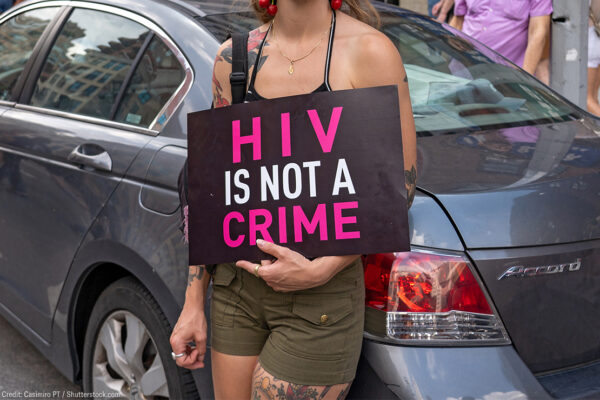Plaintiffs File Federal Suit to Overturn Tennessee’s Aggravated Prostitution Statute
Lawsuit challenges requirement to register as a violent sex offender based on HIV status
MEMPHIS, Tenn. — Tennessee’s Aggravated Prostitution statute and related sex offender registration requirements are unconstitutional and violate the Americans with Disabilities Act (ADA), according to a federal lawsuit filed today against the state by the American Civil Liberties Union, the Transgender Law Center, and the ACLU of Tennessee in the U.S. District Court in Memphis on behalf of four Jane Doe plaintiffs and OUTMemphis, the state’s oldest and largest service provider for LGBTQ+ people.
Plaintiffs argue that the Aggravated Prostitution statute is rooted in fear and discrimination, targeting people living with HIV for harsh punishment and forcing them to register as “violent sex offenders” for the rest of their lives. Criminalizing people with HIV defies evidence-based best practices and is patently unlawful as it singles out people living with HIV — a protected disability — for harsher punishment.
“People convicted of Aggravated Prostitution must spend years in prison and then register as violent sex offenders for the rest of their lives – meaning they cannot access the housing, employment, healthcare and community life that they need to get back on their feet,” said Molly Quinn, executive director of OUTMemphis. “This statute solely targets people because of their HIV status and keeps them in cycles of poverty, while posing absolutely zero benefit to public health and safety.”
“HIV stigma is becoming a thing of the past, and it’s time for state law to catch up. OUTMemphis fights so that queer people are free to live in safety, with dignity, and we believe everyone deserves that regardless of their HIV status.”
Tennessee’s Aggravated Prostitution law was passed in 1991 at a time of national panic over HIV. The law targets people engaged in sex work, enhancing their charges from misdemeanors to felonies solely based on HIV status, making it difficult to find other employment. Since then, many states have moved on from criminalizing HIV, better understanding the rates and methods of transmission and the way criminalization is counterproductive to effective testing and treatment. New treatments such as Anti-Retroviral Therapy (ART) and Pre-Exposure Prophylaxis (PrEP) can reduce viral loads to undetectable levels, blocking the possibility of transmission.
And yet, Tennessee state law enhances sex work from a misdemeanor to a felony, solely based on HIV status, which has long been recognized as a disability protected from discrimination under the Americans with Disabilities Act. Tennessee has no comparable law for any other infectious disease, even those that are more prevalent and transmissible than HIV.
“Disability discrimination is illegal,” said Alexis Agathocleous, deputy director of the National ACLU’s Racial Justice Program, “and yet the Aggravated Prostitution singles out economically-marginalized people living with HIV for excessively harsh punishment. The results are predictable: Black women are the targets of this archaic, unscientific law – many of whom are simply trying to secure food, a place to sleep, or a way to meet their basic needs.”
Entirely divorced from science, Tennessee’s law applies indiscriminately, ignoring that either party to a sexual encounter can ensure against HIV transmission in many simple and effective ways.
“Each of us, regardless of our race, our genders, or our HIV status, deserves to be treated with dignity and respect and welcomed as full members of our communities,” said Milo Inglehart (he/him), staff attorney at Transgender Law Center. “With today’s filing, we join the ACLU, ACLU-TN, OUTMemphis, and our individual plaintiffs to challenge the counterproductive and discriminatory Aggravated Prostitution statute that unlawfully singles out people living with HIV, disproportionately impacts Black transgender and cisgender women, and places lifelong, punitive restrictions on those who are criminalized for trying to survive.”
“The Aggravated Prostitution statute is a relic from when HIV first emerged in the 1980s and is motivated by fear, misinformation and discrimination — not sound science or evidence,” said Jeff Preptit, ACLU-TN staff attorney. “Instead of criminalizing HIV, which disproportionately targets transgender and cisgender Black women who are already socially and financially marginalized, lawmakers should invest in evidence-based public health responses to support people living with HIV to end the epidemic. All Tennesseans should be able to live a full life free from discrimination and harm, regardless of our health conditions.”
In addition to violating the ADA, the lawsuit also argues that, among other things, the law violates equal protection, due process and the prohibition against cruel and unusual punishment.
The plaintiffs are asking the court to strike down the Aggravated Prostitution statute and the resulting lifetime sex offender registration requirement as clearly discriminatory because they unlawfully punish people on the basis of a protected disability.
The complaint filed today can be found online at: https://www.aclu.org/cases/outmemphis-v-lee?document=Complaint
Background on the legal challenge to Tennessee’s discriminatory Aggravated Prostitution law can be found here: https://www.aclu.org/documents/fact-sheet-legal-challenge-to-tennessees-discriminatory-aggravated-prostitution-law
For more information about the case: https://www.aclu.org/cases/outmemphis-v-lee#legal-documents



